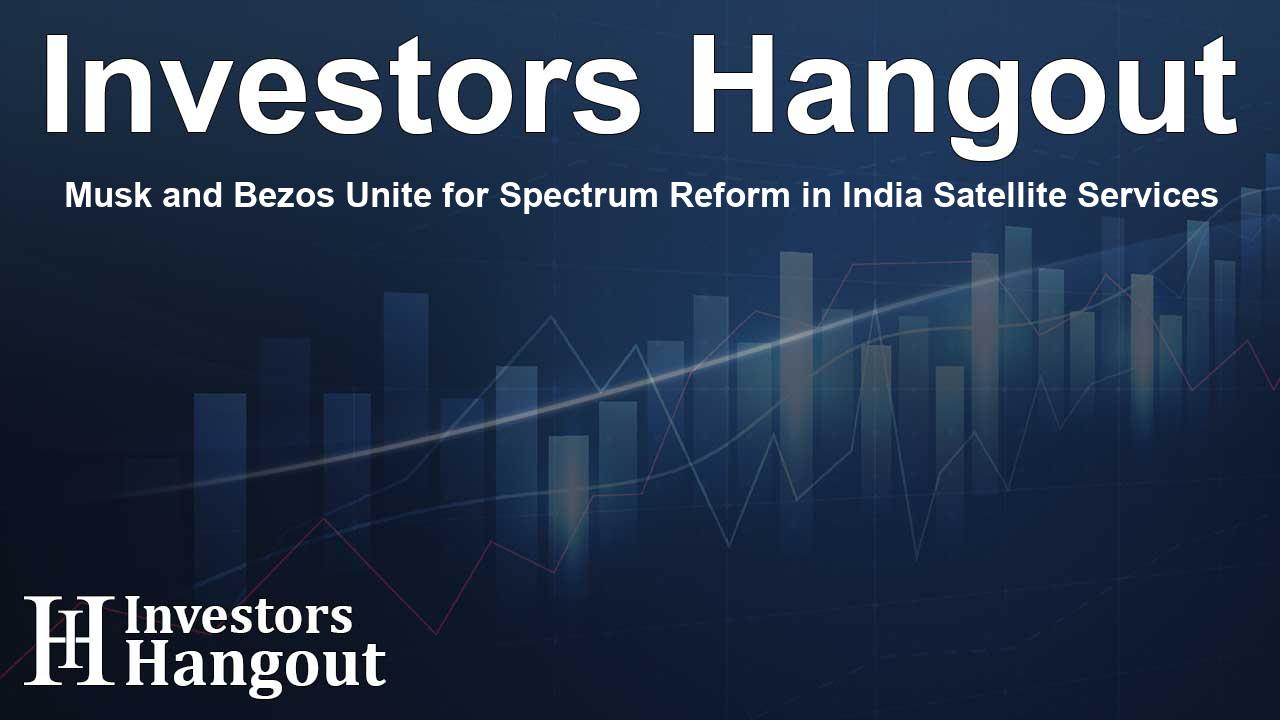Musk and Bezos Unite for Spectrum Reform in India Satellite Services

Strategic Moves by Musk and Bezos for Satellite Communication
The world of satellite communications is witnessing major developments as two of the tech industry's most influential figures, Elon Musk and Jeff Bezos, take significant steps to reshape the landscape in India. Both leaders are at the forefront with their respective companies — Musk with **Starlink** and Bezos with **Project Kuiper**. Their ambition? To push for affordable satellite communication services in a rapidly evolving market.
Advocating for Lower Spectrum Charges
Recently, both **Starlink** and **Project Kuiper** have appealed to the Telecom Regulatory Authority of India (TRAI) for a reduction in spectrum charges to a modest 1% of their annual revenues. They are also seeking a long-term license spanning 20 years, which they believe will enable them to provide more cost-effective satellite communication services. This initiative aims to cater particularly to Indian consumers and businesses that currently find themselves underserved.
The Importance of Shared Resources
One of the central arguments presented by **Starlink** is that the satcom spectrum should not be assessed at market rates, given that it is a shared resource. They assert that high market rates could create barriers for new entrants in the satellite market, stifling innovation and competition. This argument is particularly pertinent in light of the Indian government's recent decision not to auction the spectrum, a move that both **Starlink** and Amazon have welcomed.
Industry Reaction and Challenges
While the push for reform has received support, it has not come without challenges. Telecom operators like **Reliance Jio** have voiced their concerns, arguing that the decision against auctioning the spectrum raises constitutional issues and could be seen as favoring certain players over others. In contrast, another major player, **Airtel**, has suggested a potential middle ground. They propose a differentiated pricing model for satellite services based on their specific end-use, indicating the nuanced negotiations that lie ahead.
Government's Stance on Fair Pricing
The Indian government has acknowledged these concerns and hinted that it will strive to maintain a level playing field regarding spectrum pricing. This acknowledgment marks just the beginning of a significant dialogue on how satellite communication can be structured in India moving forward, especially as the nation seeks to expand its digital infrastructure.
The Broader Implications for Satellite Services
The ongoing discussions regarding spectrum charges are pivotal not just for **Starlink** and **Project Kuiper**, but also for the future of satellite services in India. If successful, this advocacy for lower charges could lead to greater accessibility of satellite communication for underserved communities, fostering inclusivity towards digital communication resources.
With these changes, not only does it promise to enhance access to communication in rural areas, but it also positions India as a growing hub for satellite technology. As the landscape changes, the focus remains on how these developments will enhance connectivity and competitiveness in the Indian market.
Looking Ahead: A Competitive Satellite Market
The eyes of the industry are on the government's response to the current push for lower spectrum charges. The outcome of this important debate promises to set a significant precedent for the future pricing strategy in the satellite sector, potentially shaping the market dynamics for years to come.
Frequently Asked Questions
What are Elon Musk and Jeff Bezos pushing for in India?
They are advocating for a 1% spectrum charge and a 20-year license for satellite communication services in India.
Why do they want lower spectrum charges?
Lower charges would allow them to provide more cost-effective satellite services, especially to underserved areas in India.
What are the concerns raised by telecom operators?
Operators like **Reliance Jio** argue that the non-auctioning of the spectrum contradicts constitutional principles and could be discriminatory.
How is the Indian government responding?
The government has indicated that it will consider maintaining a fair pricing structure for spectrum access.
What are the potential benefits of this push?
If successful, it could result in greater accessibility to satellite communication for underserved communities in India.
About Investors Hangout
Investors Hangout is a leading online stock forum for financial discussion and learning, offering a wide range of free tools and resources. It draws in traders of all levels, who exchange market knowledge, investigate trading tactics, and keep an eye on industry developments in real time. Featuring financial articles, stock message boards, quotes, charts, company profiles, and live news updates. Through cooperative learning and a wealth of informational resources, it helps users from novices creating their first portfolios to experts honing their techniques. Join Investors Hangout today: https://investorshangout.com/
Disclaimer: The content of this article is solely for general informational purposes only; it does not represent legal, financial, or investment advice. Investors Hangout does not offer financial advice; the author is not a licensed financial advisor. Consult a qualified advisor before making any financial or investment decisions based on this article. The author's interpretation of publicly available data shapes the opinions presented here; as a result, they should not be taken as advice to purchase, sell, or hold any securities mentioned or any other investments. The author does not guarantee the accuracy, completeness, or timeliness of any material, providing it "as is." Information and market conditions may change; past performance is not indicative of future outcomes. If any of the material offered here is inaccurate, please contact us for corrections.









